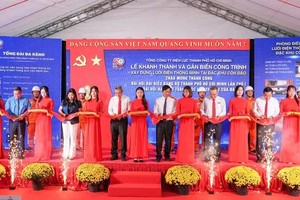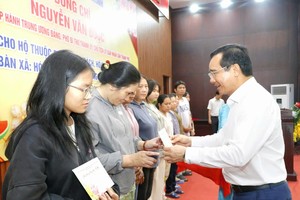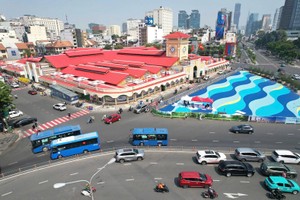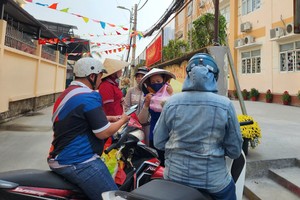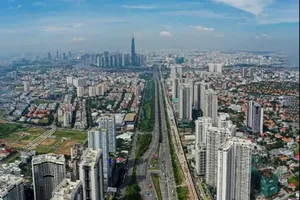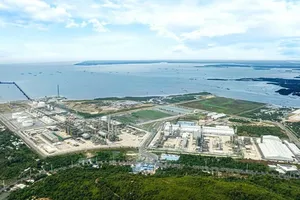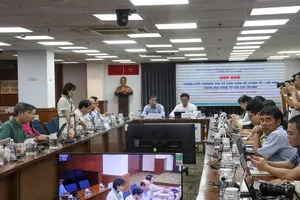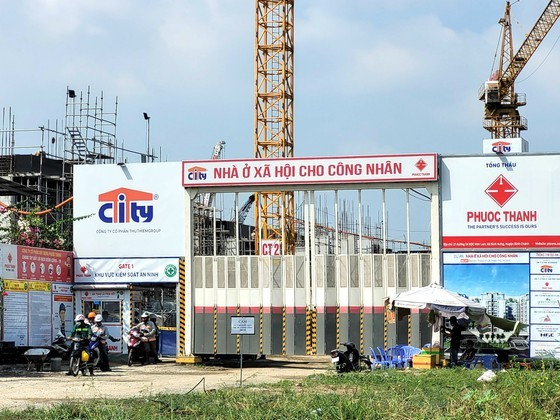 An apartment building built in Thu Duc City for low-income earners
An apartment building built in Thu Duc City for low-income earners
Ms. Tran Thi Dieu Thuy, Chairwoman of the Ho Chi Minh City Confederation of Labor said that according to a survey by the Ho Chi Minh City Labor Confederation, the demand for housing of migrant workers and employees is now very huge. On average, a boarding house in the city is about 14 square meters with the rent of VND1.6 million monthly for four lodgers to reside. Accordingly, each worker working in Ho Chi Minh City spends 10 percent-15 percent of their monthly income to pay rent.
Though shelter is a basic human need, migrant workers live in extremely precarious conditions. The desire for accommodation with the appliance is certainly a practical need of employees. Therefore, the policy of building affordable houses and accommodation for workers is what many employees desire. However, owning a house in the city is far from workers’ reach when the expected selling price of a social house range from VND1 billion to VND1.6 billion because their income is still low.
Thereby, regarding solutions for the provision of houses to employees especially immigrant ones, Ms. Dieu Thuy supposed that in addition to the construction of social housing for sale, city authorities should consider the option of building houses for rent and building worker accommodation. In particular, the development of rental housing is a special and fundamental policy that Ho Chi Minh City needs to take into account in the housing plan for workers.
Even at this moment, the city can consider a plan to use the recent resettlement house that was used as a field hospital for Covid-19 treatment into boarding houses for workers to rent. Last but not least, Ms. Thuy said that to attract workers to stay at the accommodation, the management board also popularize the convenience and comforts of living in the worker dormitory.
She continued to propose another option which is a loan policy with an interest rate of zero percent so that inn owners have funds to repair and rebuild degraded lodging houses. Through the Labor Confederation’s survey, a lot of landlords need capital to renovate their accommodation so that employees have a better living environment. In addition, most of the rented houses are located near the industrial park, near the workplace, so workers go to their companies conveniently.
According to Dr. Du Phuc Tan, head of the urban management and research division at the Ho Chi Minh City Institute for Development Studies, in the current period, the important issue is how to provide a quantity of spacious, clean, beautiful, and safe housing according to the motto ‘The State takes care of employees with good accommodation, not employees own a house'. Therefore, the housing policy for workers, employees, and low-income people needs to be changed according to the motto above.
Workers and employees also need to change their perception that they must own a house rather than rent a house because, in reality, the price of housing in a mega-city like Ho Chi Minh City is very high; it is out of workers’ reach in comparison to the income of the majority of workers.
Currently, very few businesses have poured investment in apartments for rent every year, because banks have not had a long-term loan mechanism (more than 20 years) and interest rates of such loans are quite high. In order to encourage businesses to participate in building affordable rental houses, Ho Chi Minh City administrations ought to consider supporting loan interest rates for businesses building long-term rental apartment projects with low-interest rates.
Preferential policies on affordable, long-term rental housing with qualified housing also need to be considered and enacted, such as a form of recognition of homeownership for a term; for instance 50 years instead of just ownership for several years.
When the city formulates a construction plan for residential areas adjacent to industrial zones, it is necessary to take into account the area and scale of social infrastructure works such as amusement parks, kindergartens, cultural houses, schools, medical stations, hospitals, clinics which not only meet the needs of residents in the new urban area but also meet the needs of all workers and employees in the adjacent industrial park. Simultaneously, it is necessary to have preferential policies for landlords around the industrial park to renovate, upgrade and build new inns to serve employees.
Nguyen Van Tam, a motorbike taxi driver in Ho Chi Minh City’s Nha Be outlying district said that he works as a motorbike taxi, and my wife works as a domestic helper; their total income of is about VND19 million a month.
With this income, after deducting family living expenses, their two children's school fees, and renting a room, a little money has left; worse, they have seen a shortage for many months, so they have had to borrow from relatives. Thus, he said owning a house in Ho Chi Minh City is far from his reach.
He expressed his delight at the news that Ho Chi Minh City is paying much attention to developing housing for workers and employees. However, preferential policies, supporting low-income people to buy, rent-purchase social housing, and accommodation are only for workers and employees in enterprises in industrial parks, export processing zones and a part in other areas and enterprises outside industrial parks and export processing zones.
He expected the social housing policy-makers will take heed of freelance workers. He hoped the city creates favorable conditions for freelance workers to rent social housing at a reasonable price; or support inn owners to improve their rooms, helping employees to live in a more spacious and beautiful environment.
